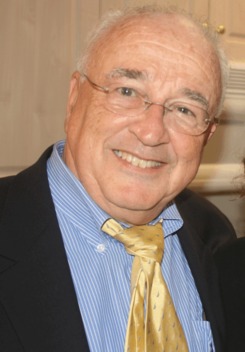The DFG granted upon our nomination to Prof. Robert M. Metzger (University of Alabama, Tuscaloosa, USA) the prestigious Mercator Visiting Professorship. Prof. Metzer will join our group from May to August 2011 and from April to August 2012 to work in our group on organic unimolecular amplifiers.The DFG offers the Mercator Programme to enable Germany's research universities to invite highly qualified scientists and academics working abroad to complete a DFG-funded stay at their institutes. The visit should focus on joint cooperative projects by the guest and host. By assuming teaching duties, visiting professors will contribute to providing a clear international dimension to the research-oriented training of young researchers in the host departments. [more... (external link)]
laudatio:
Professor Robert Melville Metzger, a Hungarian native, born in Japan in 1940 and educated in France (1946-47), Italy (1947-1959), UK (1957), and the United States of America, is a citizen of the United States, and has German ancestry (his great-grandfather Wilhelm Metzger emigrated from Oberhausen in Unterhausen, Kreis Reutlingen, Württemberg to Hungary in the 1850s or 1860s).
Metzger′s degrees in Chemistry are from UCLA (BS 1962, with research with William F. Libby) and Caltech (Ph.D. Dec. 1968, research advisor Harden M. McConnell). He was a post-doctoral fellow at Stanford University with the late Paul G. Simpson and with Michel Boudart. He taught Italian language at Stanford.
In 1971 he moved to the University of Mississippi, where he rose through the chemistry ranks from Assistant to Associate to Full Professor to Coulter Professor. In 1986 he moved to the University of Alabama as Professor of Chemistry. He is a member of the Materials Science Faculty of the University of Alabama System, and was its Tricampus Director. He has been Gastprofessor at the University of Heidelberg, Maître de Conferences Associe at the Universite de Bordeaux I, Visiting Professor at the Universities of Kopenhagen, Kyoto, Firenze, Nagoya, Padova, Parma, Rennes, and Vienna, and Guest Researcher at Tsukuba, RIKEN, and CNR Bologna. He was a Woodrow Wilson National Fellow (1962-63), the Ninth Blackmon-Moody Faculty Awardee at the University of Alabama (1999), and Schrödinger Lecturer at Trinity College Dublin (2003).
He has published 217 papers, edited or co-edited three books, directed the doctoral dissertation of 14 students, and presented lectures at conferences in 29 countries.
His first research "love" (1965-1983) was the question of cohesion in organic charge-transfer crystals (Madelung energies). In 1976 he proved by combustion calorimetry that the organic quasi-one-dimensional metal TTF TCNQ was thermodynamically stable (an open issue at the time), and developed a semi-micro rotating-bomb calorimeter, with which several other TCNQ salts were found to be just as stable as TTF TCNQ.
He solved several crystal structures, notaby picolinium tricyanoquinodimethanide, a ground-state zwitterion in 1982.
He proved in 1993 that Langmuir-Blodget multilayers of buckminsterfullerene, when exposed to potassium vapor, are superconducting.
He made contributions to magnetism, where he studied the metastable α''-Fe
16N
2 phase, and made Fe nanowires inside highly ordered acid-anodized Al
2O
3 nanopores, establishing by magnetic viscosity that the critical volume for superparamagnetism for α-Fe is 1 μm
3.
He is probably best known for his long search (1983-2010) for rectification within Langmuir-Blodgett monolayers of organic donor-acceptor molecules. Eleven such monolayer and single-moleucle recitifers have been characterized in his laboratories, and in 2007 he proved (by detecting orbital-mediated tunneling within inelastic elelctron tunneling measurements) that the current responsible for unimoleucular rectification indeed went across the molecule (through--bond tunneling rather than "through-space" tunneling).
Metzger always sought new research paths that were economical in personnel but deep in impact: in unimolecular electronics he has found one, which will keep him busy for several years to come.

